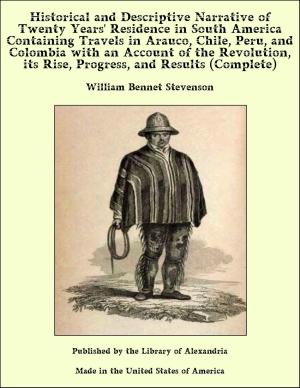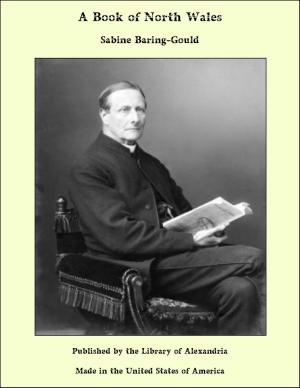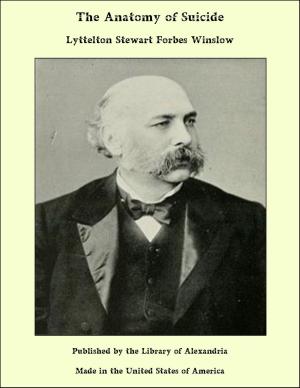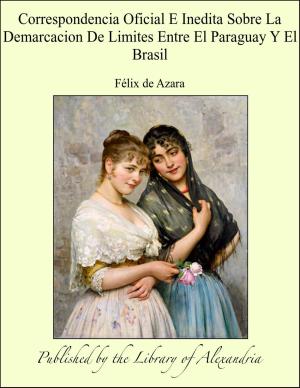The Captive in Patagonia
Nonfiction, Religion & Spirituality, New Age, History, Fiction & Literature| Author: | Benjamin Franklin Bourne | ISBN: | 9781465518019 |
| Publisher: | Library of Alexandria | Publication: | March 8, 2015 |
| Imprint: | Language: | English |
| Author: | Benjamin Franklin Bourne |
| ISBN: | 9781465518019 |
| Publisher: | Library of Alexandria |
| Publication: | March 8, 2015 |
| Imprint: | |
| Language: | English |
For California—Pernambuco—Straits of Magellan—Trading with Patagonians—Their treachery—Four men made prisoners by them—Three escape; the author detained, with promises of release on paying ransom—Indian village—The chief and his household—Eating, sleeping, and adventure in a Patagonian wigwam—Find myself booked for an indefinite residence in Patagonia, and some natural reflections thereupon. Among the early subjects of the “gold fever” that became epidemic in the autumn and winter of 1848-9, a company of twenty-five men left the port of New Bedford in the schooner John Allyne, A. Brownell, master, and B. F. Bourne, mate, for California. The vessel had been selected for her good sailing qualities, light draught of water, and general fitness for river navigation. In the haste and excitement of the time, California-bound craft carried out some rather motley companies; but we considered ourselves fortunate in the character of the men associated in this enterprise, and were organized on such principles of equality as seemed to promise entire harmony and good fellowship. Of course we had high and golden hopes, and our great object was to reach the new Ophir in the easiest and most expeditious manner. On account of the delays and dangers incident to the doubling of Cape Horn, it was determined to attempt the passage of the Straits of Magellan. We left port on the 13th of February, and for many days our time passed pleasantly, but rather monotonously, with nothing greatly to exhilarate or to depress our spirits. It was discovered, at length, that our vessel needed some running rigging. The more impatient were for going on, and making such headway as we could without it; but a majority of the company decided to run for the nearest convenient port, and replenish. We accordingly ran for Pernambuco, and anchored in the outer harbor on the 25th of March. The beauty and security of this harbor are remarkable. It is defended from the sea by a nearly perpendicular reef, extending three-fourths of the way across its entrance, with an opening of ample width for the passage of vessels to a safe anchorage. Being but eight degrees south of the equator, the town lies continually under the burning rays of a tropical sun. Its appearance is like that of most Spanish and Portuguese cities, abounding in high and massive buildings, with more of the castle than of the counting-house or dwelling in their outward expression, built upon narrow, irregular streets, that are constantly alive with men and beasts of divers colors and forms. Men from the country, driving their mustangs, mules and asses, laden with produce; wealthy and noble citizens borne by servants in palanquins; women bearing water in buckets, tubs and urns, which they balance on their heads without the aid of their hands, and walk off under as erect as so many midshipmen;—all the sights and sounds have a pleasant strangeness, that made our visits on shore highly agreeable. The churches, which are quite numerous, have nothing admirable or attractive outside, but the richness of their interior decoration testifies to the prevailing orthodoxy and fervor of devotion to the Church of Rome. The church is, indeed, the grand receptacle of the wealth of the country. Every bueno católico of them, rich, or poor, will sooner stint himself and his family in their daily comforts, or even necessaries of life, than omit his due contribution to mOther church. Our stay at Pernambuco was short, which must excuse a more particular description of its notabilities. Having obtained the articles we needed, we stood out to sea. Nothing occurred on our passage to the straits worthy of particular record. We spoke one or two vessels, and spent some time “gaming” with them,—the nautical phrase for visiting. On the 30th of April we made Cape Virgin, and stood in for the Straits of Magellan. In company with us, and bound for the same golden country, by the same course as ourselves, were bark Hebe, of Baltimore, and schooner J. B. Gager, of New York. We were becalmed off the mouth of the straits for several hours, and Captain Brownell visited the Hebe. He returned just before night. A fair wind setting in from the eastward, we all stood in, the J. B. Gager, as being best acquainted with the navigation, taking the lead. The three vessels anchored about midnight, within twelve miles of the first narrows
For California—Pernambuco—Straits of Magellan—Trading with Patagonians—Their treachery—Four men made prisoners by them—Three escape; the author detained, with promises of release on paying ransom—Indian village—The chief and his household—Eating, sleeping, and adventure in a Patagonian wigwam—Find myself booked for an indefinite residence in Patagonia, and some natural reflections thereupon. Among the early subjects of the “gold fever” that became epidemic in the autumn and winter of 1848-9, a company of twenty-five men left the port of New Bedford in the schooner John Allyne, A. Brownell, master, and B. F. Bourne, mate, for California. The vessel had been selected for her good sailing qualities, light draught of water, and general fitness for river navigation. In the haste and excitement of the time, California-bound craft carried out some rather motley companies; but we considered ourselves fortunate in the character of the men associated in this enterprise, and were organized on such principles of equality as seemed to promise entire harmony and good fellowship. Of course we had high and golden hopes, and our great object was to reach the new Ophir in the easiest and most expeditious manner. On account of the delays and dangers incident to the doubling of Cape Horn, it was determined to attempt the passage of the Straits of Magellan. We left port on the 13th of February, and for many days our time passed pleasantly, but rather monotonously, with nothing greatly to exhilarate or to depress our spirits. It was discovered, at length, that our vessel needed some running rigging. The more impatient were for going on, and making such headway as we could without it; but a majority of the company decided to run for the nearest convenient port, and replenish. We accordingly ran for Pernambuco, and anchored in the outer harbor on the 25th of March. The beauty and security of this harbor are remarkable. It is defended from the sea by a nearly perpendicular reef, extending three-fourths of the way across its entrance, with an opening of ample width for the passage of vessels to a safe anchorage. Being but eight degrees south of the equator, the town lies continually under the burning rays of a tropical sun. Its appearance is like that of most Spanish and Portuguese cities, abounding in high and massive buildings, with more of the castle than of the counting-house or dwelling in their outward expression, built upon narrow, irregular streets, that are constantly alive with men and beasts of divers colors and forms. Men from the country, driving their mustangs, mules and asses, laden with produce; wealthy and noble citizens borne by servants in palanquins; women bearing water in buckets, tubs and urns, which they balance on their heads without the aid of their hands, and walk off under as erect as so many midshipmen;—all the sights and sounds have a pleasant strangeness, that made our visits on shore highly agreeable. The churches, which are quite numerous, have nothing admirable or attractive outside, but the richness of their interior decoration testifies to the prevailing orthodoxy and fervor of devotion to the Church of Rome. The church is, indeed, the grand receptacle of the wealth of the country. Every bueno católico of them, rich, or poor, will sooner stint himself and his family in their daily comforts, or even necessaries of life, than omit his due contribution to mOther church. Our stay at Pernambuco was short, which must excuse a more particular description of its notabilities. Having obtained the articles we needed, we stood out to sea. Nothing occurred on our passage to the straits worthy of particular record. We spoke one or two vessels, and spent some time “gaming” with them,—the nautical phrase for visiting. On the 30th of April we made Cape Virgin, and stood in for the Straits of Magellan. In company with us, and bound for the same golden country, by the same course as ourselves, were bark Hebe, of Baltimore, and schooner J. B. Gager, of New York. We were becalmed off the mouth of the straits for several hours, and Captain Brownell visited the Hebe. He returned just before night. A fair wind setting in from the eastward, we all stood in, the J. B. Gager, as being best acquainted with the navigation, taking the lead. The three vessels anchored about midnight, within twelve miles of the first narrows















